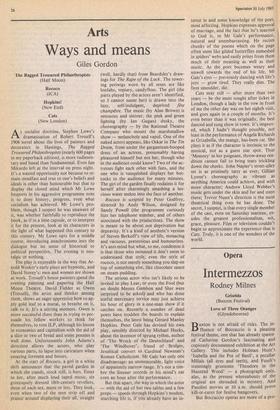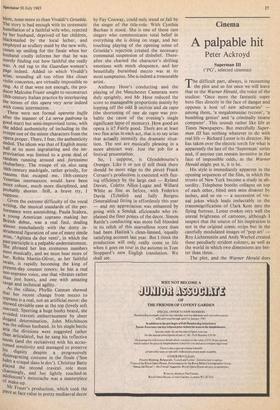Opera
Intermezzos
Rodney Milnes
Griselda (Buxton, Festival) Love of Three Oranges (Glyndebourne)
Buxton is not afraid of risks. The in- fluence of Boccaccio is a pleasing festival theme, one that has already spawn- ed Catherine Gordon's fascinating and copiously documented exhibition at the Art Gallery. This includes Holman Hunt's 'Isabella and the Pot of Basil', a peculiar Millais (all eyes and teeth), and Fuseli's stunningly gruesome 'Theodore in the Haunted Wood' — a photograph only, alas, as the present whereabouts of the original are shrouded in mystery. And Pasolini movies at 10 a.m. should prove kill-or-cures for festive hangovers.
But Boccaccio operas are more of a pro-
blem, none more so than Vivaldi's Griselda. The story is bad enough with its systematic humiliation of a faithful wife who, rejected by her husband, deprived of her children, blackmailed by the local lecher, and employed as scullery maid by the new wife, comes up smiling for the finale when her husband coolly informs her that he was merely finding out how faithful she really was. A red rag to the Guardian women's Page indeed. Added to which Vivaldi's arias, sounding all too often like closet violin concertos, are virtually impossible to sing. As if that were not enough, the pro- ducer Malcolm Fraser sought to reconstruct 18th-century Italian practice by interleaving the scenes of this opera very serva indeed with comic intermezzos.
These were not formal operette buffe after the manner of La serva padrona (a good start) but semi-improvised turns, with the added authenticity of including in the troupe one of the minor characters from the opera proper. There, I fear, the authenticity ended. The idiom was that of English music hail at its most ingratiating and the im- provisation was limited to a great deal of random running around and fortissimo rhubarbery. The troupe of six also sang 16th-century madrigals, rather prissily, for reasons that escaped me. 18th-century Venetian intermezzos would have been more robust, much more disciplined, and Probably shorter. Still, a brave try, I suppose.
Given the extreme difficulty of the vocal writing, the musical standards of the per- formance were astonishing. Paula Scalera, a Young American soprano making her British debut, was a real find, dealing almost nonchalantly with the dotty in- strumental figuration of one of many simile arias, 'Agitata da due venti', in which the Past participle is a palpable understatement. She phrased her less strenuous numbers most musically, and we must hear more of her. Robin Martin-Oliver, as her faithful swain, is rapidly becoming the king of Present-day counter tenors: he has a real neo-soprano voice, one that vibrates rather than just hoots, and one with amazing range and technical agility. As the villain, Phyllis Cannan showed that her recent change from mezzo to soprano is a real, not an artificial move: she showed enviable ease at the top (lovely soft staccari). Sporting a huge bushy beard, she avoided travesti embarrassment by sheer dogged determination. John Mitchinson was the odious husband. In his single hectic aria the divisions were suggested rather than articulated, but he sang his reflective music (and the recitatives) with his accus- tomed sensitivity and managed to preserve n.!s, dignity despite a progressively
habit costume in the finale ('Son a craque dans le dos'). Christine Batty
played the second aravesti role most charruhiglY, and her lightly touched-in adolescent's moustache was a masterpiece of make-up.
Mr Fraser's production, which took the Piece at face value in pretty mediaeval decor by Fay Conway, could only stand or, fall by the singer of the title-role. With Cynthia Buchan it stood. She is one of those rare singers who communicates total belief in everything she is doing on stage, and her touching playing of the opening scene of Griselda's rejection created the necessary communal suspension of disbelief. There- after she charted the character's shifting emotions with much eloquence, and her beautifully burnished mezzo was at its most sumptuous. She is indeed a treasurable artist.
Anthony Hose's conducting and the playing of the Manchester Camerata were duly sprightly, and Mr Hose reduced the score to manageable proportions mainly by lopping off the odd B section and da capo (the shortening of one da capo, was pro- bably the cause of the evening's single significant lapse of memory). How good an opera is it? Fairly good. Theit are at least two fine arias in each act, that is to say arias that actually intensify the dramatic situa- tion. The rest are musically pleasing in a more abstract way. Just the job for a festival presentation.
So, 1 suppose, is Glyndebourne's Oranges. Like it or not (I still think there should be more edge to the piece) Frank Corsaro's production is executed with fizz- ing efficiency by the large cast — Ryland Davies, Colette Alliot-Lugaz and Willard White as fine as before, with Federico Davia (Tchelio) and Sally Burgess (Smeraldina) fitting in effortlessly this year — and my appreciation was enhanced by going with a Sendak aficionado who ex- plained the finer points of the decor. Simon Rattle's conducting was more full blooded in its relish of this marvellous score than had been Haitink's clean-limned, !equally satisfying account last year. But I think the production will only really come to life when it goes on tour in the autumn in Tom Stoppard's new English translation. We shall see.







































 Previous page
Previous page